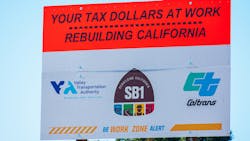Trucking companies don't love the federal motor fuels tax that supports our highway infrastructure. But long ago they decided it's better than the alternatives, like tolls and weight-distance taxes. So, with more electric vehicles now riding U.S. roads for free, the American Trucking Associations' Highway Policy Committee wrapped its recent meeting at the ATA Management Conference & Exhibition with talk of the most effective way to assess user fees in an electrified future.
The preceding presentations made it clear a fair and efficient solution will be difficult to formulate.
Jana Jarvis, Oregon Trucking Association president and CEO, appropriately was the first to comment. Her state launched a voluntary vehicle-miles traveled (VMT) program, OReGO, in 2015 and has had a weight-mile tax for trucks since 1933.
"I'm from Oregon, the only state that has 84-plus different weight classifications and configuration rates, with an agency that cannot begin to assess what the evasion rate is in our weight-mile tax," Jarvis said, using the polite term for "cheating."
"So this whole system works well on paper, but I cannot get our DOT to tell me what the cost of collection is," she said. "I have a pretty good idea it's well in excess of 20%. The cost of a collection for a fuel tax is 0.5%, which means you have to raise the rates higher to get the same revenue and to support whatever it is you're supporting.
"And, in Oregon, we have an obligation to pay our 'fair share,' and lately, the calculations have shown we're overpaying by 32%. So, to get the rates changed, I have to go back to the legislature and get that corrected. This is very complicated."
Read more about the potential highway tax systems of the future at FleetOwner.com, a Bulk Transporter affiliate.
